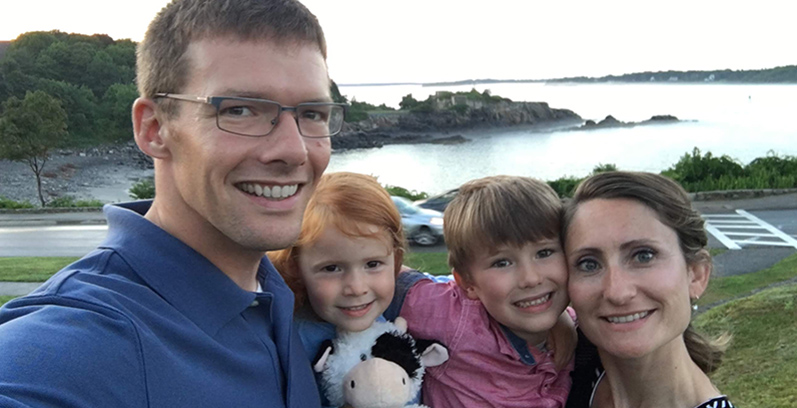By Sarah Tuff Dunn
Russell Hirschorn has plenty of talking points on his résumé—meat-packer at B. Rosen, webmaster at Bedbathstore.com, and systems analyst at Hess Corporation—before his current seven-year stint at Polaris Management, which provides management and technology consulting services to life sciences companies. But there’s one that really stuck with recruiters since he graduated from UVM in 2009: sticker collecting.
“To this day, I’m still well known for that,” says Hirschorn of the hobby. “It was a great differentiator in interviews that made it more of a friendly discussion than an interrogation.”
![]() A Long Island native, Hirschorn studied management information systems at UVM upon realizing the long-term career options in a rapidly expanding industry. “Every company has some kind of technology component,” he says. “Whether it be internal systems or technology products, every organization is a potential job opportunity.”
A Long Island native, Hirschorn studied management information systems at UVM upon realizing the long-term career options in a rapidly expanding industry. “Every company has some kind of technology component,” he says. “Whether it be internal systems or technology products, every organization is a potential job opportunity.”
Here, Hirschorn shares tips on how to turn hobbies, and hard-earned education, into potential job opportunities.
Tell us about your career stepping-stones at Bedbathstore.com and Hess.
Bedbathstore.com was an after-school and weekend job doing odd tasks—inventory, website management, filling orders, and so on. Nothing exciting. This experience, coupled with working with my dad in the meatpacking business (waking up at 3 a.m. to fill veal and lamb orders and pack livers) pushed me to do well at school by knowing what I definitely didn’t want to do. I met a Hess contact at a UVM networking event and prepared a lot, which included learning as much as I could about the company before the interview. I was honest and well spoken, sent handwritten thank-you cards on personalized stationary to everyone I met, and ended up with an opportunity that really kick-started my career.
And what has kept you at Polaris for seven years?
How dynamic the work is on a day-to-day basis. I could be writing presentations for the partners or clients, working with the development and testing team, managing progress and answering questions, designing new features for our product, or working with our consulting teams to ensure they are well prepared for new client implementations. I also really enjoy the accountability and ownership. I’m responsible for everything from the financials of each delivery to the stability of the technical infrastructure to the job satisfaction of my team and the people I manage.
What can project management teach us about managing career trajectories?
The majority of project management is being organized. Follow-ups, actions, dates, questions, resources, and financials all have to be clearly prioritized, assigned, and executed. The larger the project, the more organized you have to be. Knowing your stakeholders well, both professionally and personally, will tell you what they feel is highest priority and what things will make them happy or not so happy.
How did you foster these skills at UVM?
Learning how to develop an application, how data is stored, and how to relate technical concepts to business processes was probably the most important information I came out of UVM with. This skill made me a very strong project manager and gave me the ability and confidence that I could manage any technology project regardless of the subject matter since I could understand the technical infrastructure and advise how best to accomplish and resolve business processes and issues within the architecture of an application.
How else did your experience at UVM help you prepare for your career?
The career center in the business school was an incredible resource. I had a fantastic advisor there, Emily Grenier, and she worked with me several days a week on getting an internship, fine-tuning my résumé, connecting me with other UVM alum, and giving me interview tips and tricks. But the most important thing is to do very well in school and to participate in extracurricular activities that align to career goals after graduation. Great grades (and I say “great” because it is extremely competitive) and very hard work (which includes networking) are the key to any position and the ability to excel in your career.
What is your advice on finding simple solutions to complex problems?
A complex problem is usually a result of many smaller problems that are in the way of finding the solution. Break it down, don’t get worked up, and ask colleagues for their help and insight. Different perspectives often help identify different options for resolving problems.
What communications and networking advice would you pass along to students?
Everyone you meet is a potential opportunity. Never miss the chance to follow up with an email, schedule a date to get a coffee or drink, or just to have a quick phone chat. Most people love talking, especially about themselves, so ask more questions rather than talking about what you want, and ensure the conversation goes smoothly by preparing and rehearsing the discussion.
Learn more about UVM’s Project Management Certificates and Programs.
Read more UVM Alumni Advice interviews at learn.uvm.edu.
-Sarah Tuff Dunn, of Shelburne, is a freelance writer and editor.




